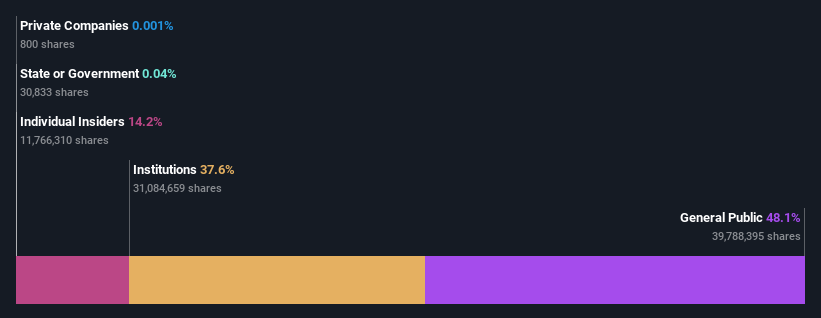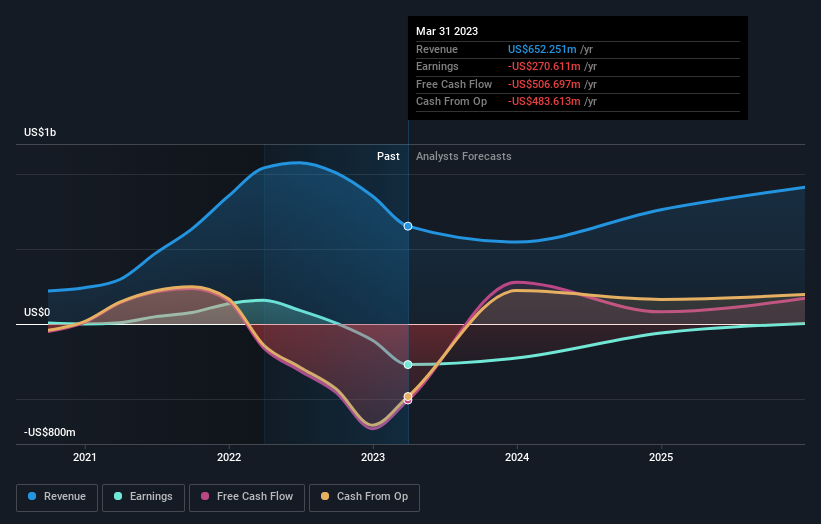- United States
- /
- Consumer Finance
- /
- NasdaqGS:UPST
Painful week for retail investors invested in Upstart Holdings, Inc. (NASDAQ:UPST) after 14% drop, institutions also suffered losses
Key Insights
- Significant control over Upstart Holdings by retail investors implies that the general public has more power to influence management and governance-related decisions
- A total of 25 investors have a majority stake in the company with 44% ownership
- Recent sales by insiders
Every investor in Upstart Holdings, Inc. (NASDAQ:UPST) should be aware of the most powerful shareholder groups. We can see that retail investors own the lion's share in the company with 48% ownership. Put another way, the group faces the maximum upside potential (or downside risk).
While institutions who own 38% came under pressure after market cap dropped to US$2.6b last week,retail investors took the most losses.
Let's take a closer look to see what the different types of shareholders can tell us about Upstart Holdings.
View our latest analysis for Upstart Holdings

What Does The Institutional Ownership Tell Us About Upstart Holdings?
Institutions typically measure themselves against a benchmark when reporting to their own investors, so they often become more enthusiastic about a stock once it's included in a major index. We would expect most companies to have some institutions on the register, especially if they are growing.
We can see that Upstart Holdings does have institutional investors; and they hold a good portion of the company's stock. This suggests some credibility amongst professional investors. But we can't rely on that fact alone since institutions make bad investments sometimes, just like everyone does. It is not uncommon to see a big share price drop if two large institutional investors try to sell out of a stock at the same time. So it is worth checking the past earnings trajectory of Upstart Holdings, (below). Of course, keep in mind that there are other factors to consider, too.

We note that hedge funds don't have a meaningful investment in Upstart Holdings. With a 13% stake, CEO David Girouard is the largest shareholder. For context, the second largest shareholder holds about 7.8% of the shares outstanding, followed by an ownership of 3.9% by the third-largest shareholder.
Our studies suggest that the top 25 shareholders collectively control less than half of the company's shares, meaning that the company's shares are widely disseminated and there is no dominant shareholder.
While it makes sense to study institutional ownership data for a company, it also makes sense to study analyst sentiments to know which way the wind is blowing. There are plenty of analysts covering the stock, so it might be worth seeing what they are forecasting, too.
Insider Ownership Of Upstart Holdings
The definition of an insider can differ slightly between different countries, but members of the board of directors always count. Management ultimately answers to the board. However, it is not uncommon for managers to be executive board members, especially if they are a founder or the CEO.
I generally consider insider ownership to be a good thing. However, on some occasions it makes it more difficult for other shareholders to hold the board accountable for decisions.
It seems insiders own a significant proportion of Upstart Holdings, Inc.. Insiders own US$373m worth of shares in the US$2.6b company. That's quite meaningful. Most would say this shows a good degree of alignment with shareholders, especially in a company of this size. You can click here to see if those insiders have been buying or selling.
General Public Ownership
With a 48% ownership, the general public, mostly comprising of individual investors, have some degree of sway over Upstart Holdings. This size of ownership, while considerable, may not be enough to change company policy if the decision is not in sync with other large shareholders.
Next Steps:
While it is well worth considering the different groups that own a company, there are other factors that are even more important. Take risks for example - Upstart Holdings has 3 warning signs (and 2 which are concerning) we think you should know about.
Ultimately the future is most important. You can access this free report on analyst forecasts for the company.
NB: Figures in this article are calculated using data from the last twelve months, which refer to the 12-month period ending on the last date of the month the financial statement is dated. This may not be consistent with full year annual report figures.
New: AI Stock Screener & Alerts
Our new AI Stock Screener scans the market every day to uncover opportunities.
• Dividend Powerhouses (3%+ Yield)
• Undervalued Small Caps with Insider Buying
• High growth Tech and AI Companies
Or build your own from over 50 metrics.
Have feedback on this article? Concerned about the content? Get in touch with us directly. Alternatively, email editorial-team (at) simplywallst.com.
This article by Simply Wall St is general in nature. We provide commentary based on historical data and analyst forecasts only using an unbiased methodology and our articles are not intended to be financial advice. It does not constitute a recommendation to buy or sell any stock, and does not take account of your objectives, or your financial situation. We aim to bring you long-term focused analysis driven by fundamental data. Note that our analysis may not factor in the latest price-sensitive company announcements or qualitative material. Simply Wall St has no position in any stocks mentioned.
About NasdaqGS:UPST
Upstart Holdings
Operates a cloud-based artificial intelligence (AI) lending platform in the United States.
Exceptional growth potential with mediocre balance sheet.
Similar Companies
Market Insights
Community Narratives



